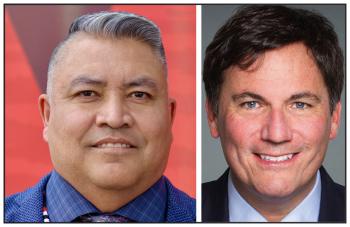Image Caption
Local Journalism Initiative Reporter
Windspeaker.com
Nothing in Canada’s auditor general’s report on the First Nations and Inuit Policing Program came as a surprise to British Columbia Regional Chief Terry Teegee, who is co-lead on the Assembly of First Nations (AFN) Justice and Policing portfolio.
“We always knew that chronic underfunding of policing has been an issue with many First Nations police forces or tripartite agreements across the country,” he said.
Part of that underfunding could be due to funds that were left on the table instead of being invested in policing.
Auditor General Karen Hogan, who released her report March 19, found that Public Safety Canada, which administers the policing program, left $13 million unspent in the 2022/23 fiscal year and was “at risk” of not disbursing $45 million of funds for the 2023/24 fiscal year.
The First Nations and Inuit Policing Program operates self-administered police service agreements, as well as community tripartite agreements (CTA). The first type sees First Nations and Inuit communities operating their own police forces. CTA has the RCMP provide dedicated policing services to the community.
The audit also found that when funds were allocated to communities, Public Safety Canada did not have an approach in place to do so on an equitable basis.
And $500 million of additional funding in 2021, meant to increase the number of community tripartite agreements signed between First Nations communities, the provinces or territories, and the federal government, instead was used to stabilize existing programs.
The report also pointed out that the length of the self-administered and CTAs, and their automatic renewals, meant that engagement with communities was deferred for long periods of time and data was not being collected to ensure that services were meeting the needs of the communities.
As for the RCMP, which were funded to have members dedicated to servicing only First Nations communities, that rarely happened because RCMP were lacking in personnel and spread too thin.
“Overall, we found that neither Public Safety Canada nor the Royal Canadian Mounted Police worked in partnership with Indigenous communities to provide community-based proactive policing services,” said Hogan, calling the findings “concerning.”
In addition to the performance audit, Hogan noted the call by First Nations for legislation that would deem First Nations policing an essential service.
Public Safety Minister Dominic LeBlanc said he would be addressing the recommendations in Hogan’s report and had already spoken with her.
He said Public Safety Canada had consolidated Indigenous-related programs and policy analysis into a single team to make program delivery more efficient and more transparent.
“Our government is also working with Indigenous communities and organizations to develop legislation that will recognize First Nations police services as an essential service,” said LeBlanc.
That legislation is a necessity, says Teegee, who believes that is the only way First Nations will receive equitable funding for policing.
The AFN is part of a larger task group looking at the legislation. Teegee contends, however, that the ongoing consultation is insufficient.
“I don't think it's adequate enough to really understand what exactly the legislation encompasses so I think we need a better process, more inclusive process for First Nations,” he said.
Jurisdiction is also a concern, Teegee adds.
“I would like to see the legislation passed as soon as possible, but if the jurisdiction is going to be an issue, I can't see us agreeing to a legislation that doesn't recognize or uphold the United Nations Declaration on the Rights of Indigenous Peoples,” he said.
The UN declaration states that Treaty and inherent rights must be respected.
“Maybe the healthy and better compromise is shared jurisdiction,” said Teegee.
LeBlanc said the legislation needs to “strike a balance between recognizing the unique realities of Indigenous communities…while obviously respecting the constitutional division of powers which gives provinces and territories oversight of the administration of justice in their jurisdictions.”
He said he is confident that can happen.
According to the Canada Public Safety website, legislation is anticipated to be introduced in either the spring or summer of 2024.
Local Journalism Initiative Reporters are supported by a financial contribution made by the Government of Canada.

